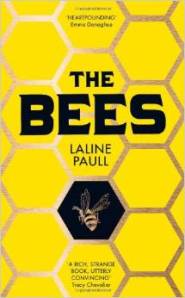The cell squeezed her and the air was hot and fetid. All the joints of her body burned from her frantic twisting against the walls, her head was pressed into her chest and her legs shot with cramp, but her struggles had worked - one wall felt weaker. She kicked out with all her strength and felt something crack and break. She forced and tore and bit until there was a jagged hole into fresher air beyond.
For Flora 717, 'low of kin and sweeper of filth', the bulky heroine of Laline Paull's ambitious literary debut The Bees, life was never going to be easy. Born too big, too dark, too ugly and to a lowly sanitation caste, Flora's only saving grace is that (remarkably for her species) she can talk. Marked as 'most notable' by a lofty priestess bee, who just happens to be passing as Flora explodes in a waxy cloud from her pupation cell; she is saved from immediate execution by the deformity police. Leaving her detested sisters behind, Flora is quickly promoted through the ranks of the hive: feeding the Queen's revered spawn, tending her mewling grubs and is even, after proving herself courageous in a bout of waspish mortal combat, invited to attend on the Queen herself.
I enjoyed the authentically bee-like limitations felt by Flora as she learns to encounter and manage the hive-mind, but on occasion felt it to be too heavy and prescriptive a plot device to lose myself in the alien world created by Paull. As though the hive-mind itself exerted too much pull on narrative and pushed me at unnatural pace through the hive (and its surroundings) like a package holiday - sometimes it was all that I wanted to slow the narrative and have more time to explore aspects of Flora's strange home that were only glanced at. Though, this being said, the world created for The Bees is, in all manners; it is well realised, larger-than-life and its dangers - both internal and external - are deliciously chilling.
'You fled inspection.' One of them pulled at the girl's wings, while another examined the four still-wet membranes. The edge of one was shrivelled.
'Spare me,' she cried. 'I will not fly, I will serve in any other way-'
'Deformity is evil. Deformity is not permitted.'
Before the bee could speak the two officers pressed her head down until there was a sharp crack. She hung limp between them and they dropped her body in the corridor.
As is the case in so many of the animal fantasies to precede it, The Bees provides a fascinating loupe through which to scrutinise human nature and the Paull's decision to frame her literary debut in the unfamiliar insect world is inspired. As readers are gradually made aware of Flora's maternal destiny they discover that the brilliance of The Bees is hidden within a prism of difference and racial identity.
More than anything I loved Paull's realisation of hive-culture, of the foragers (so much like the fighter aces of the first and second World Wars) the Melissae and their enforcers, the sinister fertility police, who evoke the cruelty of prejudice and eugenics; but also their 'Maleness', the bloated, pompous and selfish drones, who even in the depths of their Dionysian pursuit of hedonism demand pity as much as derision.
Sir Quercus turned to the sisters.
'Fortune favours me, does she not, ladies?' And he swelled his sturdy thorax, raised his fur in three tall crests on his head, and pumped his male aroma so it rose up around him in a cloud. Some sisters swooned, and some, like Sister Prunus, spontaneously applauded.
'Who will groom me?'
Paull creates a wonderfully alien world that I just couldn't wait to get back to, in this bold and ambitious (sexy-bee) dystopia that will please lovers of Margaret Atwood and Beatrix Potter alike. This is Logan's Run in an apiary and it's brilliant.
~
Phillip Clement studied English and Creative Writing in Aberystwyth. Since he left there he has lived in a library, written short stories and reviewed books. You can find out more by visiting




